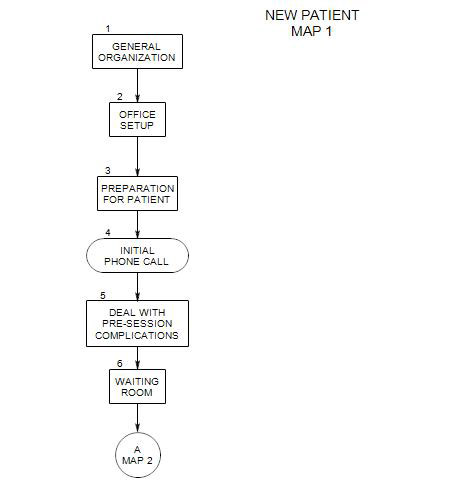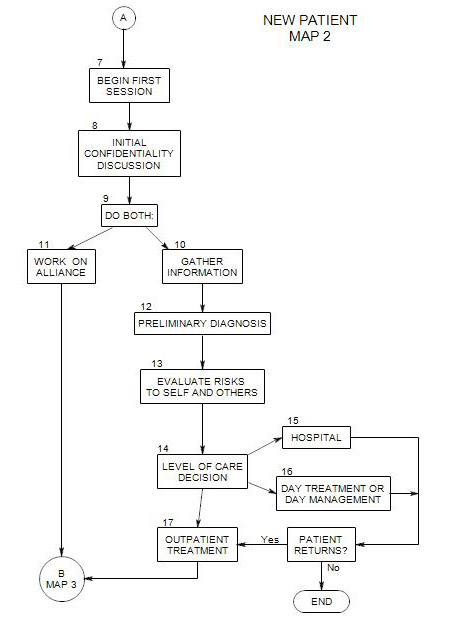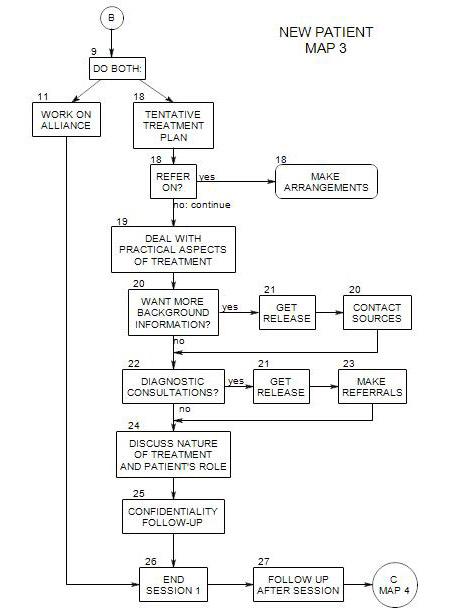-
Follows Section 18 on Map 3
Any treatment plan must take into account such practical issues as estimated length of treatment, times of appointments, number of sessions per week, and payment. All of these may be limited by your availability, your fee, and your patient’s availability and financial resources. These issues need to be considered early on.
19a. Financial
There are many ways payment can be arranged. Most private practice arrangements involve a fee for services, in which you are paid an hourly fee for sessions with the patient.
This means you have some kind of contractual understanding, whether it be formal or informal, verbal or written, for this patient alone or for a class of patients into which this patient falls.
The contract can be between you and the patient or you and the insurance or managed care company. Each possibility includes additional choices, as shown in the map Dealing with Fees.
Within that context, you need to gather information about the patient’s ability to pay. If payment will be made in part by an insurance company, you need sufficient information to be in contact with the company to determine eligibility and amount of coverage.
This includes
- Name of Patient
- Name of Insured
- Social Security Number or other identification number of Insured
- Date of Birth of Patient
- Name and telephone number of insurance company
- Name of patient’s plan, group
If the patient doesn’t have insurance with psychotherapy coverage or if the insurance doesn’t mandate your fee, you will need to discuss the fee with the patient.
More on contacting the patient’s insurance company and/or managed care company appears in Section 20.
19b. Schedule
Typically, arranging a time to meet will take some negotiating, as it affects the schedules of both you and your patient. How the patient deals with the limits of your schedule can sometimes give diagnostic information.
19c. Accessibility to Patient
Ideally, your office will be easy for your patient to get to. However, some people will travel great distances in adverse circumstances to make it to a therapy session. This may become an issue at the time of the first appointment, and possibly disrupting to treatment.
It can be a matter of concern with some patients, if they try to negotiate the terms of treatment based on the convenience of the travel to your office. Generally it’s a mistake to allow session frequency to depend on patient convenience in getting to you; and it can be a problem if the patient’s time availability leads to disrupting the session times for other patients or inconveniences you to the point of resentment.
One way to deal with this is to ask during the first session about the patient’s ability to get to you at the available time. If he/she has no problem, good. If there is a problem and you can resolve it, good. If not, it may be necessary to postpone treatment until the issue can be managed, or terminate, or send the person to another therapist.
19d. Dealing with Missed Appointments
It is generally desirable to have an understanding about how you will handle missed appointments from the beginning because it helps to set the frame for treatment and the tone for your relationship with the patient.
Here you have a choice – you can have a general policy that you announce during the first session, and then wait to see the patient’s reaction. There are many possibilities, including:
- Fix appoint times, and insist that the patient pays whether he/she comes or not. Some analysts have gone so far as to fix the times for the entire next year.
- Don’t charge if you get enough advance notice – some therapists require 24 hours’ notice, or 48, or a week.
- Make exceptions for unavoidable conflicts – a car accident on the way, or a flood that required the patient’s full attention.
- Make exceptions for minor conflicts – an appointment with another professional like a dentist, and warning.
- Allow a change of time whenever needed.
- Don’t charge if you are able to fill the time with another patient.
- Have different policies for different patients – possibly depending on the patient’s level of ego development.
You can also negotiate a – more or less unique – policy with each patient. It may be difficult keeping track of a lot of different policies, however.
Typically, in the past, therapists have charged for missed appointments. Insurance companies have understandably been unhappy at paying for sessions that the patient does not attend; one approach is to charge the patient a specified amount as the full fee for a missed session and not bill insurance.
Some managed care companies have mandated that no fee could be charged for missed appointments. This may encourage a cavalier attitude toward treatment in some patients – which may be part of the rationale for it.



